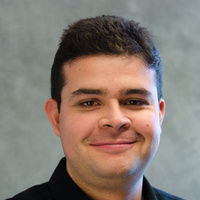Menu
- Undergraduate
- Graduate
- Research
- News & Events
- People
- Inclusivity
- Jobs
Back to Top Nav
Back to Top Nav
Back to Top Nav
We develop an agent-based model of cultural adoption and validate geographic patterns of transmission in our model against a novel dataset of innovative words that we identify...

Abstract: Adoption of cultural innovation (e.g., music, beliefs, language) is often geographically correlated, with adopters largely residing within the boundaries of relatively few well-studied, socially significant areas. These cultural regions are often hypothesized to result from either (i) identity performance driving the adoption of cultural innovation or (ii) homophily in the networks underlying diffusion. In this study, we show that demographic identity and network topology are both required to model the diffusion of innovation, as they play complementary, interacting roles in producing its spatial properties. We develop an agent-based model of cultural adoption and validate geographic patterns of transmission in our model against a novel dataset of innovative words that we identify from a 10% sample of Twitter. Using our model, we can directly compare a combined network + identity diffusion model to simulated network-only and identity-only counterfactuals -- allowing us to test the separate and combined roles of network and identity. While social scientists often treat either network or identity as the core social structure in modeling language change, we show that key geographic properties of diffusion actually depend on both factors. Although network and identity each give rise to similar pathways of transmission between USA's counties, each one also influences different mechanisms of diffusion. Specifically, we find that the network principally drives spread to and from urban counties via weak-tie diffusion, while identity plays a disproportionate role in transmission to and from rural counties via strong-tie diffusion. Our work suggests that models must integrate network and identity in order to understand and reproduce the adoption of innovation.
Bio:Daniel Romero is an Associate Professor of Information, Complex Systems, and Computer Science at the University of Michigan. He received his Ph.D. at the Cornell University Center for Applied Mathematics (CAM) in 2012 and was a Postdoctoral Fellow at the Northwestern Institute on Complex Systems (NICO) from 2012 to 2014. His main research interest is the empirical and theoretical analysis of Social and Information Networks, with a particular interest in understanding the mechanisms involved in network evolution, information diffusion, and interactions among people on the Web and in complex organizations.
Events are free and open to the public unless otherwise noted.